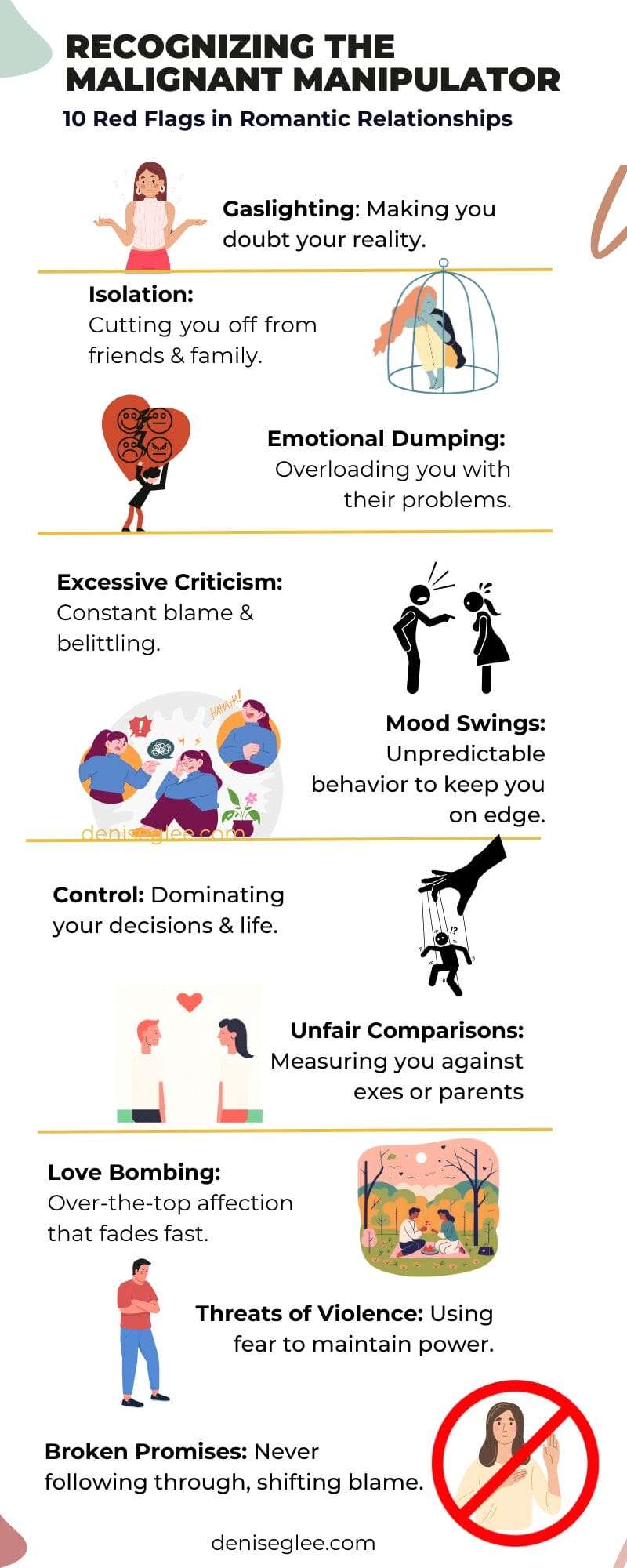
The Ultimate Con: 10 Red Flags of Emotional Manipulation
- Published:
- Updated: February 19, 2025
Are you in a new relationship or recently ended a relationship and wondered, “Something is off, but I just don’t know exactly what it is?” For some of us, the relationship feels as if we were thrown into an emotional grinder.
Our guts ripped to shreds. And our confidence torn to pieces.
If you want to understand signs of danger in a past or present romantic relationship, this article is for you. As a healing and leadership coach, I want to save you from a miserable romantic affair. That’s, why we will decode ten red flags or signs that you may have been emotionally manipulated in your relationship.
First, let’s define manipulation. This is important because many of us throw this word around without proper context or use. Next, we will discuss signs of maladaptive emotional manipulation.
There is nothing wrong with manipulation. Every form of com munition should be a win-win scenario. The issue is whether others' behavior is harmful to you and/or the relationship.
Denise G. Lee Tweet
Is it or was it really malignant emotional manipulation?
In my practice, I prioritize teaching my clients the power of their words. We use words to express our needs and get our needs met. And every form of communication involves some form of manipulation.
For example, if you want to be treated well by others, you would do your best to treat others well in kind. Moreover, you would say or do things that would receive a positive reaction from others. This is manipulative behavior where you are aware how your actions and words impact others.
There is nothing wrong with emotional manipulation. Every form of communication should be a win-win scenario. The issue is whether others’ behavior is harmful to you and/or the relationship.
Next, let’s discuss malignant manipulation in a relationship and how it impacts your self-worth and confidence.
What Does Maladaptive Emotional Manipulation in a Relationship Look like?

If someone is manipulating you or others in a win-lose situation, that is called malignant or maladaptive manipulation. This behavior goes beyond poor communication—it’s about controlling, deceiving, and taking advantage of others to serve their own needs, often at the expense of your safety and well-being. While poor communication can lead to misunderstandings and frustration, malignant manipulation is intentional and harmful. Self-serving and preoccupied narcissists are well-known for using these tactics to maintain control and superiority in relationships.
Traits of a Malignant Manipulator or Narcissist:
- Takes advantage of others to meet their needs, often disregarding others’ safety and security.
- Resistant to feedback or any form of criticism, often responding with defensiveness or anger.
- Deflects or ignores accountability for their inappropriate actions, avoiding responsibility.
Malignant manipulation from a narcissist can erode trust, damage the integrity of the relationship, and breed resentment over time.
It’s important to note that not every difficult interaction is a sign of malignant manipulation. Sometimes, challenges in communication stem from misunderstandings, stress, or lack of communication skills. To learn more about the difference, check out this article on poor communication that explores how miscommunication can affect relationships without the harmful intent of manipulation.
With that in mind, let’s move on to the next section, where we’ll discuss the signs that strongly indicate you are or were in a malignant manipulative relationship.
If your gut is telling you they are treating you poorly, believe it. Your body knows before your mind that something is wrong with the relationship.
Denise G. Lee Tweet
10 Signs You Are Being Emotionally Manipulated

1. Gaslighting
You are just making things up again! It really isn’t a problem.
Gaslighting is a form of manipulation where the malignant manipulator distorts or denies reality to make the other person question their own perceptions, memories, or sanity. They may try to convince you that your feelings or experiences are invalid or exaggerated.
This is a common tactic with those who have a narcissistic personality disorder, low social conscious or has psychopathic tendencies.
2. Isolation
If you loved me, then you wouldn’t need to spend time with anyone else but me!
Malignant manipulators are predators that often try to isolate their victims from friends, family, or other support systems. By cutting off your connections with others, using this kind of narcissistic behavior increases their control over you and limits your access to alternative perspectives.
The isolation begins by trying to keep you focused on them at all times or by criticizing your friends, family or others who have a positive influence over your life. In my opinion, isolation is one of the primary signs you are being manipulated in a relationship.
3. Emotional Dumping
I know I have been talking about this with you every day for the past week, but I feel alone and I need someone to share my painful feelings with.
When you are with someone who has poor or no boundaries, it is easy to unload or dump your emotions on them. This is where you just talk endlessly to someone without care or concern for their feelings.
In the depths of my sexual addiction, I just wanted to talk to anyone with a pulse. No matter how much I talked, it did not help me or them. I wasn’t really interested in healing or their advice – I just wanted to unload some of the internal shame that felt too heavy to bear alone.
4. Excessive blaming, criticism or belittling
I would have a better career and life if it weren’t for you!
Malignant manipulators frequently criticize and demean their victims, undermining their self-esteem and confidence.
They may constantly point out flaws, mock achievements, or engage in name-calling to keep you feeling inadequate and reliant on their validation. It may start out initially as suggestions, tips or input and then as trust is gained, launches into a full barrage of disparaging and demeaning comments.

5. Unpredictable mood swings
Malignant manipulators can display extreme mood swings or unpredictable behavior, keeping you on edge and uncertain of how they will react. This volatility makes it easier for them to control and manipulate your behavior.
To be fair, some people may suffer from bipolar disorder and need medication to regulate their emotions, but others have learned to wield their emotions as a bludgeon against fragile egos.
6. Control and power dynamics
There will be hell to pay if you don’t come home by 9pm tonight!
Malignant manipulators try to control and dominate others. They may use tactics like setting strict rules, making decisions without asking you, or showing dominance to keep their power.
A malignant manipulator might claim their control is for ‘your good,’ but over time, it becomes clear they are only interested in their own needs. Constant control from this type of person weakens your confidence in your ability to make decisions and choices.
7. Comparing you to a parent of former lover
8. Love Bombing
It starts with the grand gestures: constant texts, over-the-top compliments, and attention that feels intoxicating—at first.
But here’s the truth: love bombing isn’t love. It’s control wrapped in charm.
A narcissist doesn’t flood you with affection because they care. They do it to hook you fast, so you miss the red flags waving right in front of you. Once they’ve got you, the compliments fade, the control tightens, and you’re left wondering what happened to the person who seemed so “perfect.”
Real love grows with time. Love bombing? That’s just emotional bait. I talked about love bombing on social media. Click the link below to join the conversation!
🚩 Ever had someone try to BULLDOZE their way into your life? 🚩
— Denise G. Lee (@DeniseGLee) February 10, 2025
Non-stop texts.
Question after question.
Flattery that feels too good to be true.
👀 That’s not charm. It’s love bombing.
It might feel flattering—especially if you’re craving connection—but it’s a classic move…
9. Threats of physical violence
10. Broken promises

What to Do If You Notice Signs of Emotional Manipulation
First, congratulations on being honest with yourself. It takes courage to admit that you might be—or have been—in an unhealthy relationship. That honesty is the first step in understanding how the relationship has affected your self-worth and confidence. Recognizing manipulation isn’t easy, especially when emotions are involved. So, give yourself credit for noticing the signs.
Now, let’s talk about what to do next.
Don’t Waste Time Diagnosing Them
Calling a manipulative person, like a malignant narcissist, “sick” or trying to figure out why they act the way they do won’t help you. In fact, it can keep you stuck. People with harmful behaviors often don’t understand or care about how their actions hurt others. They aren’t looking to change, and no amount of explaining or confronting will make them suddenly see the light.
Create Distance—Emotionally, Financially, and Physically
Your best option is to put space between you and the manipulator. Start with emotional distance. Stop engaging in arguments or trying to “make them understand.” Their goal is often to keep you hooked through guilt, confusion, or fear.
If you’re financially tied to this person, begin planning how to separate your resources. This might mean opening your own bank account, getting advice from a financial advisor, or finding support from trusted friends or professionals.
Physical distance is the final step, especially if you feel unsafe. Whether it’s moving out, staying with a friend, or even seeking legal help, prioritize your safety above all.
Understand Their Behavior Won’t Change
A malignant narcissist doesn’t see their behavior as a problem. If you confront them, they’ll likely get defensive, deny everything, or even blame you. This is part of their manipulation. It’s not because you didn’t explain it well enough; it’s because they don’t want to change.
The image below sums up these tips. Next, I will share my final thoughts.

Final Thoughts
If you suspect you being a victim of malignant manipulation, consider seeking support from trusted friends, family, or life coach like myself who can provide guidance and help you navigate the situation.
In the meanwhile, please work to create or maintain a self-care routine. This will help you to see things positively and objectively and guard yourself from harmful people in the future.
What have you done to keep yourself emotionally safe from harmful behavior? I’d love to know! Use this link to share your thoughts.
Dig deeper: Click here to listen to this episode from my podcast about toxic relationships or press the play button below.
Written by Denise G. Lee
DISCLAIMER: THIS ARTICLE DOES NOT PROVIDE MENTAL HEALTH ADVICE
The information in this article is for informational purposes only. No material in this article or website is to be a substitute for professional medical and/or mental health advice, diagnosis or treatment.
Always seek the advice of your physician or other qualified health care provider with any questions you may have regarding a medical condition or treatment and before undertaking a new health care regimen, and never disregard professional medical advice or delay in seeking it because of something you read from me or anyone else online.
Also, this article is not designed to diagnose or treat you or anyone with a suspected mental health illness. Please, if you need help, seek appropriate help from a lawyer, health care provider or law enforcement officer.





